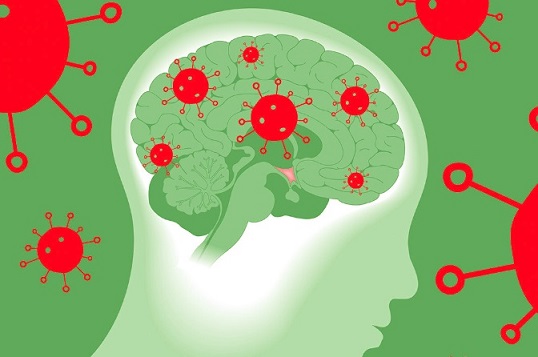German Study Finds That 77 Percent of Individuals with Neurological Post-COVID Syndrome Have Memory Issues!
Nikhil Prasad Fact checked by:Thailand Medical News Team Jan 12, 2025 3 months, 1 day, 3 hours, 16 minutes ago
Medical News: Neurological Post-COVID Syndrome (PCS), a condition affecting some individuals who have recovered from COVID-19, is linked to significant cognitive impairments, including memory and concentration issues. A recent study conducted by researchers from the Department of Neurology and Internal Medicine at Ruhr-University Bochum, Germany, explored these cognitive challenges. This
Medical News report delves into the study's findings and their implications for understanding and managing PCS.
 German Study Finds That 77 Percent of Individuals with Neurological Post-COVID Syndrome Have Memory Issues!
German Study Finds That 77 Percent of Individuals with Neurological Post-COVID Syndrome Have Memory Issues!
COVID-19, caused by the SARS-CoV-2 virus, has left millions struggling with lingering symptoms even after their acute illness subsided. One of the most concerning manifestations is PCS, where symptoms such as fatigue, memory lapses, and concentration difficulties persist for more than three months post-infection. This study sheds light on the neurological aspects of PCS, which are particularly debilitating for many sufferers.
Investigating the Cognitive Impact of PCS
The study recruited 60 individuals with neurological PCS, 15 COVID-19 survivors without lingering symptoms (non-PCS group), and 15 healthy controls (HC). Participants underwent a comprehensive neuropsychological assessment to evaluate various cognitive domains, including memory, attention, and processing speed.
Participants were evaluated using tools that measured cognitive flexibility, short-term and working memory, motor and cognitive fatigue, depressive and anxiety symptoms, and visuomotor processing speed. The study aimed to identify specific areas of cognitive dysfunction and establish a clearer understanding of PCS-related neurological impairments.
Key Findings of the Study
-Fatigue and Psychological Distress: Patients with PCS reported significantly higher levels of fatigue, depressive symptoms, and anxiety compared to both the non-PCS group and healthy controls. Using the Fatigue Scale for Motor and Cognitive Functions (FSMC), researchers found that cognitive fatigue was particularly prominent, with PCS patients scoring an average of 39 points compared to 16 in the healthy group.
-Impaired Memory and Concentration: Memory and concentration deficits were prevalent among PCS patients. Around 77% of PCS patients reported memory issues, while 76.7% experienced concentration difficulties. Tests on verbal short-term and working memory confirmed these self-reported symptoms, revealing that PCS patients performed significantly worse than both control groups.
-Cognitive Flexibility and Word Fluency: PCS patients exhibited reduced cognitive flexibility and verbal fluency. Tasks requiring word retrieval and categorization posed significant challenges, reflecting difficulties with both phonetic and semantic word fluency.
-Reaction Times and Alertness: PCS patients s
howed prolonged reaction times in attention tasks, particularly under conditions requiring sustained mental effort. Repeated testing demonstrated that their performance worsened over time, indicating cognitive fatigue.
-Processing Speed and General Screening: Using tools such as the Symbol Digit Modalities Test (SDMT) and the Montreal Cognitive Assessment (MoCA), the researchers identified slower processing speeds and reduced overall cognitive performance in PCS patients. These deficits were more pronounced when compared to both non-PCS individuals and healthy controls.
Exploring Possible Causes
The exact mechanisms driving these neurological symptoms remain unclear. However, researchers propose several potential explanations:
-Direct Viral Effects: SARS-CoV-2 may directly invade brain cells, leading to inflammation and damage.
-Systemic Inflammation: Persistent immune activation could contribute to cognitive impairments.
-Microvascular Damage: Changes in small blood vessels may reduce blood flow to critical brain areas.
-Autoimmunity: The body’s immune response might mistakenly target its own nervous system.
These findings align with other studies that have detected abnormalities in brain imaging, including reduced grey matter volume and changes in white matter integrity among PCS patients.
Implications for Treatment and Recovery
The study emphasizes the need for targeted therapeutic interventions to address these neurological deficits. Current treatment options are limited, but several approaches show promise:
-Cognitive Rehabilitation: Tailored exercises to improve memory and attention could benefit PCS patients.
-Pharmacological Treatments: Antidepressants such as vortioxetine have shown potential in alleviating cognitive symptoms in PCS, especially in individuals with elevated inflammatory markers.
-Lifestyle Interventions: Regular physical activity, adequate sleep, and stress management may support cognitive recovery.
-Experimental Therapies: Techniques like transcranial direct current stimulation and hyperbaric oxygen therapy are being explored for their potential to enhance brain function in PCS patients.
Study Limitations and Future Directions
The study's findings provide valuable insights, but several limitations must be acknowledged. The single-center design and relatively small sample size may limit the generalizability of results. Additionally, the study primarily included patients with neurological complaints, potentially biasing the findings toward more severe cases. Future research should expand on these findings with larger, more diverse populations and investigate the long-term trajectory of PCS-related cognitive impairments.
Conclusions
Neurological PCS significantly impacts cognitive functions, with memory, concentration, and fatigue being the most affected domains. These impairments can profoundly affect daily life, work, and overall well-being. Addressing these issues requires a multidisciplinary approach, combining medical treatment, psychological support, and lifestyle modifications. Increased awareness among healthcare providers and the general public is crucial to ensure timely diagnosis and intervention.
The study findings were published in the peer-reviewed journal: Scientific Reports.
https://link.springer.com/article/10.1038/s41598-025-85919-x
For the latest Long COVID News, keep on logging to Thailand
Medical News.
Read Also:
https://www.thailandmedical.news/news/sars-cov-2-nsp7-protein-impairs-synaptic-plasticity-in-the-brain-leading-to-memory-loss
https://www.thailandmedical.news/news/new-research-links-covid-19-inflammation-to-memory-issues-months-after-recovery
https://www.thailandmedical.news/news/oxford-study-reveals-that-mild-covid-19-impairs-long-term-memory-but-not-short-term-memory
https://www.thailandmedical.news/news/research-reveals-alarming-link-between-covid-19-and-memory-loss
